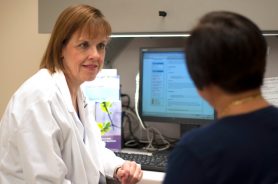Questions to ask your doctor about cancer prevention
By asking your doctor the right questions you can get the information you need to help lower your cancer risk.

Is your relationship with your doctor built on one-way communication? Your doctor tells you what you need to do and you listen. It’s important to ask your doctor questions if you want to take charge of your health.
“If you don’t ask questions you won’t know if you’re doing the things that are right for you to help lower your cancer risk,” says Therese Bevers, M.D., Medical Director of the Cancer Prevention Center at MD Anderson. “Something might be missed.”
And it’s important to be sure you’re asking the right questions. Follow these tips to make sure you’re asking your doctor the important questions to help reduce your risk for cancer.
- Ask your doctor for a cancer risk assessment. Your personal history, family history and lifestyle choices all affect your cancer risk.
- Be specific. Ask your doctor what your risk is for certain cancers. Your risk for one type of cancer may be greater than another type of cancer. Getting specific will allow you to make sure you’re getting the information you need.
- Ask your doctor about nutrition. Your doctor should be able to advise you on healthy eating choices. Did you just start a new diet or weight loss plan? Let your doctor know that, too. It will give them a more complete picture of your health.
- Talk about exercise. Just like nutrition, you need to talk to your doctor about your exercise habits so you know you’re doing the right exercises for your body and getting in enough activity. Aim for at least 30 minutes of physical activity, five days a week.
- Ask about cancer screening exams. While there are standard screening guidelines, they may vary, depending on family history, personal health history, inherited risk factors and behaviors. Talk to your doctor to make sure your screening exams are up to date.
- Come prepared. If you’re visiting a new doctor, bring your personal and family medical history. And know the details. If you’ve had a colon polyp, it’s important to know what kind. If you’ve had a skin biopsy, bring the results. This will give your doctor a more accurate picture of your overall cancer risk. To get more information about your medical history, call your last health care provider and ask for your records.
If you’re making a return visit to your doctor, let them know about any changes to your family or personal history.
Request an appointment at MD Anderson's Lyda Hill Cancer Prevention Center online or call 844-931-2478.
Print this list and bring it your next appointment. If you come prepared you’re more likely to get the information you need to help lower your cancer risk.




